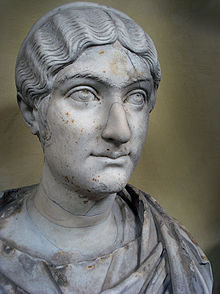| Furia Sabinia Tranquillina | |||||||||
|---|---|---|---|---|---|---|---|---|---|
| Augusta | |||||||||
 Marble of Furia Sabinia Tranquillina at Museo Chiaramonti | |||||||||
| Empress of the Roman Empire | |||||||||
| Tenure | 241–244 AD | ||||||||
| Born | c. 225 AD | ||||||||
| Died | aft. 244 AD | ||||||||
| Spouse | Gordian III | ||||||||
| Issue | Furia | ||||||||
| |||||||||
| Father | Gaius Furius Sabinius Aquila Timesitheus | ||||||||
Furia Sabinia Tranquillina (c. 225 – aft. 244 AD) was the Empress of Rome and wife of Emperor Gordian III.[1][2] She was the young daughter of the Praetorian Prefect Timesitheus by an unknown wife.[3]
In 241 AD her father was appointed the head of the Praetorian Guard by the Roman Emperor Gordian III. Timesitheus was known to have great influence over the emperor, who was only 16 years old in 241 AD, having become emperor at age 13 in 238 AD, sponsored in this position by the power of the Praetorian Guard.[4][5] After becoming the head of the Praetorian Guard, Timesitheus "effectively governed the Empire for Gordian".[5] In May of 241 AD, Tranquillina was married to Gordian. She became a Roman Empress and received the honorific title of Augusta.
When Gordian III and Timesitheus went on a campaign against Shapur I of Persia, Tranquillina went with them.[2] Her father died in 243 AD, of unknown but potentially suspicious causes. To replace him, Philip (Marcus Julius Philippus) became head of the Praetorian Guard, and quickly set to plotting to overthrow the young Gordian III.[5] Tranquillina's husband, Gordian III, died in 244 AD under unclear, unknown circumstances, aged only 19.[5] Tranquillina is believed to have outlived both her father and husband, however it is unclear what happened to her afterwards.[2]
- ^ Wood, Susan (1981-01-01). "Subject and Artist: Studies in Roman Portraiture of the Third Century". American Journal of Archaeology. 85 (1): 59–68. doi:10.2307/504966. ISSN 0002-9114. JSTOR 504966.
- ^ a b c Vagi, David (2016-09-16). Coinage and History of the Roman Empire. Routledge. ISBN 978-1-135-97125-0.
- ^ Burns, Jasper (2006-11-22). Great Women of Imperial Rome: Mothers and Wives of the Caesars. Routledge. ISBN 978-1-134-13185-3.
- ^ Fargnoli, Iole (2023), Fornalé, Elisa; Cristani, Federica (eds.), "Women's Empowerment: A Historical Introduction", Women’s Empowerment and Its Limits: Interdisciplinary and Transnational Perspectives Toward Sustainable Progress, Cham: Springer International Publishing, pp. 15–31, doi:10.1007/978-3-031-29332-0_2, ISBN 978-3-031-29332-0, retrieved 2024-06-09
- ^ a b c d Bédoyère, Guy de la (2017-02-28). Praetorian: The Rise and Fall of Rome's Imperial Bodyguard. Yale University Press. ISBN 978-0-300-22627-0.